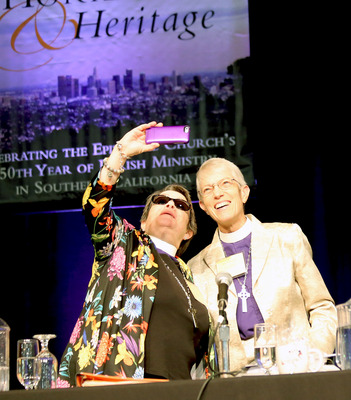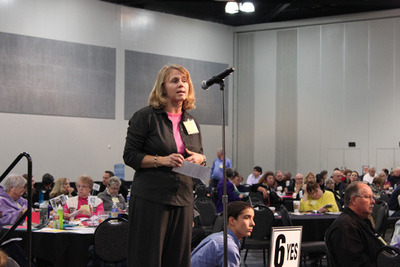While celebrating 150 years of Episcopal Church ministry in Los Angeles, Bishop Jon Bruno called upon the 119th annual meeting of the Diocese of Los Angeles to honor that legacy by building sustainable ministries for the future.
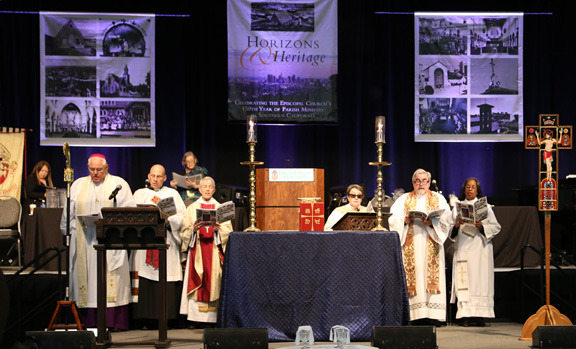
The 119th meeting of Diocesan Convention opened Dec. 5 with Eucharist. Serving at the altar were, from left: Bishop J. Jon Bruno, Deacon Timothy Warren, Bishops Suffragan Mary D. Glasspool and Diane Jardine Bruce, Bishop Guy Erwin of the Southwest California Synod of the Evangelical Lutheran Church in America and Deacon Jamie Hammons. Photo/Janet Kawamoto
From the civil war to farm worker and civil rights, marriage equality and social, economic and environmental justice, each generation of Southland Episcopalians has engaged “ministries of vitality” and continues to do so, with Seeds of Hope, Laundry Love and other emergent expressions, Bruno said during a Dec. 5 convention address to more than 700 lay and clergy delegates, visitors and guests at the Ontario Convention Center.

Bishop Guy Erwin of the Evangelical Lutheran Church in America delivers greetings from his church, with which the Episcopal Church shares full communion.
“What does it mean to invest in ministry that will continue with vitality into the future? How is such investment different than continuing to pour resources into old patterns and systems that are no longer viable?” Bruno asked during an address that included presentations by Bishops Suffragan Diane Jardine Bruce on stewardship, and Mary Douglas Glasspool about interfaith and ecumenical partnerships.
Bruno also announced plans to retire in 2018, and gave consent for the Standing Committee to call for the 2016 election of a bishop coadjutor. A search committee, to be led by the Rev. Canon Julian Bull, Campbell Hall headmaster, will be named in January 2015, Bruno said.
Southwest California Synod Bishop Guy Erwin of the Evangelical Lutheran Church in America (ELCA), a convention guest, offered congratulations for the 150 years of St. Athanasius’ Church’s witness and ministry, as did Los Angeles Mayor Eric Garcetti via video.
“This very special occasion marks the beginning of a six-month celebration recognizing 150 years of continuing parish ministry in Southern California beginning with the congregation of St. Athanasius,” Garcetti said in the video.
Included among those celebrations will be a Jan. 23-24, 2015 lecture series commemorating the spirit of a similar series created by the Rev. Elias Birdsall, St. Athanasius’ rector in 1865. He held the church’s first service on Christmas Day, 1864 with ten people. Another event, scheduled for April 19, 2015 will recall Birdsall’s stirring eulogy for President Abraham Lincoln.
“This congregation is inseparable from the history of the city and the country. Today both the parish and the diocese continue to fulfill a long record of advocacy for civil rights and justice,” Garcetti said.
As part of convention business, attendees viewed a three-part “Horizons and Heritage” video series written and narrated by Canon Robert Williams, diocesan historiographer, chronicling St. Athanasius’ history (available for viewing online in 2015). A book chronicling the presence of Episcopal ministry in Los Angeles is expected to be published next year.
Creation of a special “Horizons and Heritage Fund” to support future ministry was announced by the Rev. Lorenzo Lebrija, bishop’s officer for development. (See story here.)
‘Let it go’
Bishops Suffragan Mary Glasspool and Diane Jardine Bruce delivered rousing, applause-evoking presentations during a three-in-one bishops’ address.
Glasspool, who oversees schools as well as ecumenical, interfaith and interreligious ministries, told the convention that the two areas frequently converge and that interfaith collaboration is the “future-present” and doesn’t just incorporate prayer, worship or study but is also about activism and outreach.
Glasspool quoted a recent statement from the L.A. Council of Religious Leaders: “We advocate for comprehensive immigration reform and local care of child refugees. We collaborate for affordable housing for constituencies including veterans and the homeless mentally ill. We invest in employment and empowerment for area youth and engage regional issues of climate change and provide opportunities for interfaith prayer, dialogue and wider civil discourse.”
In essence, she said, if you want to know the future of interfaith, look around. And get involved, because “the more you can actively participate in the exceedingly diverse and pluralistic world already our reality, the stronger your rootedness and groundedness in Jesus the Christ will be.
“Stop asking the question ‘how do we get more people to come to our churches?’ Stop trying to grow the church and be the church,” added Glasspool, who closed her presentation with a soaring adaptation of a song by Robert and Kristen Anderson-Lopez from the animated movie Frozen:
It’s time to see what we can do,
To test the limits and break through,
No right, no wrong, no rules for us,
We’re free.
Let it go, let it go,
We are one with the One above.
Let it go, let it go.
We’re here to spread God’s love.
Here we stand, and here we stay.
Let the future come!
The past never held us back anyway.
‘The future’s so bright I gotta wear shades’
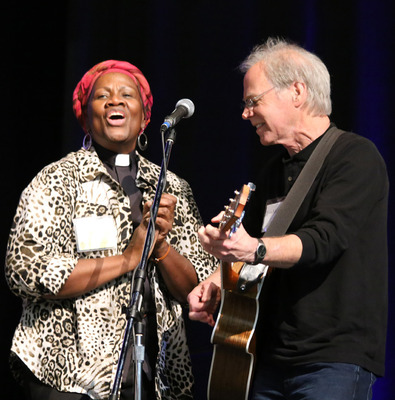
Zelda Kennedy, associate priest at All Saints Church, Pasadena, and guest musician Fran McKendree lead delegates in a rousing song during a break in proceedings.
Wearing sunglasses because of an eye infection, Bruce also invoked a song, from the musical group Timbuk3 — “The future’s so bright, I gotta wear shades” — and recalled an M&Ms symbol from a past convention: “mission and ministry happens when we all work together.”
Bruce, who counts multicultural ministries and stewardship among her diocesan responsibilities, said she has conducted “walkabouts” with a third of the congregations under her care, visiting the surrounding areas to understand “who are the neighbors” and helping to determine local community assets.
She said the Program Group on Stewardship and Development will host “tool kit” opportunities throughout the diocese in 2015 for assistance with year-round formation, including: Feb. 21 at St. Columba’s, Camarillo; April 25 at Blessed Sacrament, Placentia; May 26 at St. Mark’s, Glendale; June 13 at St. Cross, Hermosa Beach; and Aug. 29 at the Cathedral Center of St. Paul, Los Angeles
“If we all share from the great bounty that God has gifted us with, then our futures, individually and corporately, would be so bright, so bright that we all gotta wear shades,” she said. “The Program Group on Stewardship and Development is gonna help all of us make it really bright in here.”
Convention people: food justice and educational futures
Bruno named nine clergy and lay leaders as honorary canons of the Cathedral Center and honored the contributions of retiring chancellor John Shiner and treasurer Larry Sawyer (see story here). The Rev. Kirby Smith has been named treasurer-elect and Shiner’s successor will be appointed in January, Bruno said. The Rev. James Prendergast and Canon Rick Zevnik will serve as vice-chancellors.
Others who addressed convention included the Very Rev. Sylvia Sweeney, dean of Bloy House (Episcopal Theological School at Claremont), who described educational opportunities for seminarians through partnerships forged with the Claremont School of Theology, the Episcopal Divinity School in Cambridge, Mass., and Church Divinity School of the Pacific in Berkeley.
“We are leading the way into the future of theological formation,” by making education more accessible to working students, she said. “Bloy House was built on a vision of the future, not the past.”
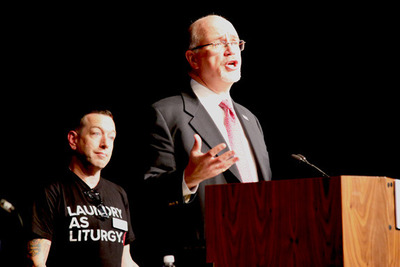
Robert Radke, president of Episcopal Relief and Development and Christian Kassoff, diocesan representative, report on the agency’s work.
Episcopal Relief & Development president Robert Radtke told convention that over the last decade, the Diocese of Los Angeles has raised $3 million to aid in global relief efforts, the third largest contributor in the Episcopal Church, after the Dioceses of Virginia and Olympia (Wash.).
A photo exhibit commemorating Episcopal Relief & Development’s 75th anniversary is displayed at St. James’ Church, Los Angeles, and then move to Campbell Hall for a Jan. 7 reception, he said.
Seeds of Hope director Tim Alderson and the Rev. Andrew Barnett, who holds the environmental studies and food justice chair at Campbell Hall, addressed issues of food justice in a video presentation. Barnett announced creation of a website to assist with food and environmental justice theological reflection.
“We’re advocating for systemic change, which is really important,” added Alderson. “There are people in communities we serve who are literally dying from food that is available to them.” He said that people associate malnutrition with starvation in the third world but “obesity is the flip side of that same coin” and creates an opportunity for nutrition education and other forms of outreach.
Bruno also asked prayers for and anointed with oil representatives of 16 young adult pilgrims who will spend Christmas in the Holy Land under the guidance of the Program Group on Youth and Young Adult Ministries.
The Rev. Lynn Jay, bishop’s chaplain to retired clergy, clergy spouses, widows and widowers, announced the addition of geographically-located chaplains for Retired Episcopal Clergy Offering Resources and Service, or RECORE, including: Julie Morris (Abundant Table Farm, Ventura County); Greg Frost (St. Andrew and St. Charles, Granada Hills); Canon Betsy Anderson; Bob Honeychurch; Canon Judy Heffron; Canon David Caffrey; Canon Bob Cornner; Reese Riley; and Barbara Stewart.
The Church Pension Group will host a 9:30 a.m. to 3 p.m. program Jan. 15 for retired clergy, clergy spouses, widows and widowers at the Cathedral Center of St. Paul, she said.
S.O.S. (Society of Spouses), an organization of clergy husbands, wives and partners, sponsored a special screening of clips from “Disturber of the Peace,” a documentary tracing the life and ministry of the Rev. Canon Malcolm Boyd, author and civil rights activist, presented by filmmaker Andrew Thomas. (For more information, visit malcolmboydfilm.com.)
Convention business: dumping fossil fuels, being ‘repairers of the breach’
Convention saved $4,000 by using less paper, fewer printed booklets, and more electronic resources, according to Secretary of Convention Janet Wylie. She hopes to move closer to a paperless convention in 2015, at an additional estimated savings of $12,000.
Delegates elected diocesan officers, approved a $6.6 million budget and vigorously debated suggested canonical changes, as well as several convention resolutions.
A proposed change to the second reading of an already amended Canon IV sparked a flurry of discussion about qualifications for vestry members. The Very Rev. Canon Mark Kowalewski, St. John’s Pro-Cathedral dean, proposed that convention add that anyone over 16 who is a communicant in good standing, “and as such shall have been faithful in working, praying and giving financially to the ministry of that mission or parish” to the changes.
Some delegates agreed, saying giving — regardless of the amount — is part of spiritual maturity. But the Very Rev. Canon Jim Newman, rector of St. Bede’s, Mar Vista (Los Angeles), and others objected, saying the amendment sounded like “a poll tax” and that while many parishioners give generously in many ways to the church, not all may be able to give financially.
Kowalewski’s proposed amendment failed. Other amendments, which changed vestry qualifications to extend the required period of church attendance from six to 12 months and from a confirmed to a baptized communicant in good standing, were approved on second reading and will go into effect immediately.
Delegates also approved another minor canonical change, and overwhelmingly affirmed resolutions in support of marriage equality, disaster preparedness, the 800th anniversary of the Magna Carta, and the Charter for Compassion.

Delegate Betts Hall and priest-in-charge Canon Frank Alton of the Congregation of St. Athanasius get ready to cast ballots in an election for officers.
“We believe that the charter for compassion is one of the most fruitful ways to be interfaith at this moment in history,” said the Rev. Canon Frank Alton, St. Athanasius’ canon pastor, who introduced the resolution. “If we want to be the church, then we are committed to making compassionate practice a part of our daily lives and to take compassionate action as a diocese.” (More about the Charter of Compassion is online at www.charterforcompassion.org.)
Glasspool said that in October 2015 the Program Group on Ecumenical and Interreligious Concerns will sponsor 10 people “including four of our young leaders under the age of 45 to attend the Parliament of World Religions to be held in Salt Lake City,” featuring the Dalai Lama and internationally known author Karen Armstrong as keynote speakers. The gathering is expected to draw more than 10,000 participants from 80 different countries, coming together under the theme ‘reclaiming the heart of our humanity.’”
Another resolution, encouraging full divestment of fossil fuel company stock by 2021 passed 228 to 194 after lengthy discussion.
The Rev. Julie Morris, of the Abundant Table Farm, called upon delegates to be “courageous leaders for environmental justice. This resolution … is a way for putting our care for the earth, the stewardship of creation, stewardship for the earth into action.”
The Rev. Canon Gary Commins, rector of St. Luke’s, Long Beach, recalled Karl Marx’s statement in the 19th century about the Church of England as property-holders, paraphrasing that it “would more gladly give up several of the 39 articles than 1/39th of its property.” Commins added that a line item in his own church’s budget includes oil royalties and that the resolution had helped the vestry begin a conversation and consider options about what to do about it.
Those who opposed the resolution thought individuals, congregations and the diocese should stay involved and to use their influence internally to shift the policies and direction of the companies.
Delegates overwhelmingly approved a resolution regarding policing and public safety, inspired by the deaths of African American males at the hands of police — 18-year-old Michael Brown in Ferguson, Missouri; Eric Garner, 43, in Staten Island, New York; 12-year-old Tamir Rice in Cleveland, and many others.
Introduced by the Rev. Canon Ed Bacon, rector, All Saints, Pasadena, the resolution called upon Episcopalians to be “repairers of the breach” and “makers of streets safe to walk in” by engaging in dialogue with local police agencies and working to dismantle systems of racism “that make some members of our human family particularly vulnerable to police violence and to receiving unequal treatment in the justice system.”
The Rev. Ron David, Good Samaritan Hospital chaplain, challenged what he called the resolution’s lack of outrage “against the craven disregard for the humanity of the stranger, whether it be unarmed black men from urban America or the innocent brown child from Central America. There’s no expression of emotion that might just be the singular sign of solidarity with the suffering. There’s no expression of emotion that will be the necessary fuel that sustains us in what will necessarily be a long struggle.”
Similarly, the Rev. Canon Eric Law, Kaleidoscope Institute director, told the gathering that “we need to engage those who are perceived as powerful, as the oppressor, so that we can do the work that needs to be done” as well as with those affected by the unjust systems to avoid repeating the same destructive patterns.
Bruno asked for a moment of silence following the vote, to allow time “to be honest with ourselves about the racial and policing problems we have in this country” and to pray for the repose of the souls who have died because of police violence.
The 120th annual meeting of the Diocese of Los Angeles will be held Dec. 4-5, 2015 at the Ontario Convention Center.

